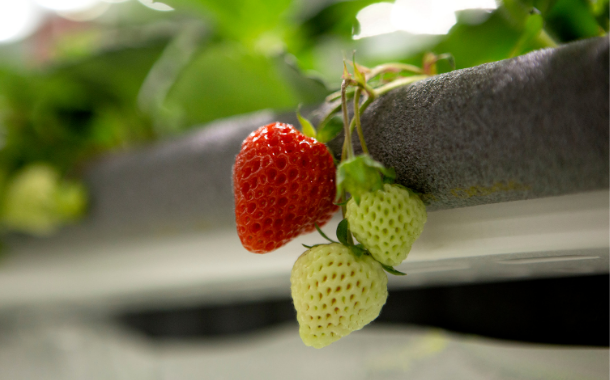
Welcome to iGrow News, Your Source for the World of Indoor Vertical Farming
Vertical Farming Startup Oishii Raises $50m In Series A Funding
“We aim to be the largest strawberry producer in the world, and this capital allows us to bring the best-tasting, healthiest berry to everyone.”
By Sian Yates
03/11/2021
Oishii, a vertical farming startup based in New Jersey, has raised $50 million during a Series A funding round led by Sparx Group’s Mirai Creation Fund II.
The funds will enable Oishii to open vertical strawberry farms in new markets, expand its flagship farm outside of Manhattan, and accelerate its investment in R&D.
“Our mission is to change the way we grow food. We set out to deliver exceptionally delicious and sustainable produce,” said Oishii CEO Hiroki Koga. “We started with the strawberry – a fruit that routinely tops the dirty dozen of most pesticide-riddled crops – as it has long been considered the ‘holy grail’ of vertical farming.”
“We aim to be the largest strawberry producer in the world, and this capital allows us to bring the best-tasting, healthiest berry to everyone. From there, we’ll quickly expand into new fruits and produce,” he added.
Oishii is already known for its innovative farming techniques that have enabled the company to “perfect the strawberry,” while its proprietary and first-of-its-kind pollination method is conducted naturally with bees.
The company’s vertical farms feature zero pesticides and produce ripe fruit all year round, using less water and land than traditional agricultural methods.
“Oishii is the farm of the future,” said Sparx Group president and Group CEO Shuhei Abe. “The cultivation and pollination techniques the company has developed set them well apart from the industry, positioning Oishii to quickly revolutionise agriculture as we know it.”
The company has raised a total of $55 million since its founding in 2016.
Motorleaf Uses AI to Predict Crop Yields for Indoor Farmers & Greenhouse Growers
Between unpredictable weather, pests, and degrading soil quality, farming is an extremely difficult way to make a living. Indoor farming, though less weather-dependent, carries its own set of burdens.
Motorleaf Uses AI to Predict Crop Yields for Indoor Farmers & Greenhouse Growers
April 16, 2018
"Republished with permission of The Spoon", Read the original article at The Spoon
Photo: Motorleaf
Share on Facebook Tweet on Twitter
Between unpredictable weather, pests, and degrading soil quality, farming is an extremely difficult way to make a living. Indoor farming, though less weather-dependent, carries its own set of burdens.
Montreal-based startup Motorleaf wants to lighten the lift for indoor farmers by improving crop yield predictions and optimizing growing conditions. The company hopes that their software, which CEO and co-founder Ally Monk likens to a “virtual agronomist,” will take the uncertainty out of farming.
To do this, Motorleaf first gathers data on the grow environment through machine vision, agricultural sensors, and historical information. It then applies algorithms and AI to help farmers determine the adjustments they need to make to the indoor grow environment to optimize their crop. Which means farmers can monitor CO2 levels, light spectrum, and other atmospheric conditions remotely through wireless devices or laptops.
Customers can opt to install Motorleaf’s own hardware (a suite of IoT-enabled sensors), though they can also just connect the Motorleaf’s software to the farm’s existing pre-installed hardware to measure and remotely adjust environmental inputs. Its interoperability makes Motorleaf an easy tool for larger greenhouse operations, ones who already have their own monitoring hardware in place, to install. “At the end of the day, we are a software company,” said Monk.
Motorleaf isn’t the only company helping indoor farmers help manage the lifecycle of their crop. In fact, it’s not even the only company which sees itself as a “virtual agronomist.” What sets it apart, however, is its ability to predict crop yield. Monk claims that Motorleaf is the first company to use AI and machine learning to increase the accuracy of yield estimations.
This is a lot more important than an average person (read: the author) might think. Commercial greenhouses pre-sell produce before their harvest based on estimations given by agronomists — though they’re not always accurate. It’s extremely difficult to guarantee the quantity or quality of their crop before it’s harvested, and miscalculations can lead to loss of profits for both the buyer and producer and also generate huge amounts of food waste.
Motorleaf claims that their software can cut yield prediction error by more than half — at least for some crops. Monk explained that each plant needs its own specialized software for yield prediction, likening farming to a recipe. “Maybe they think there’s a right recipe to growing kale; they need this many nutrients, this much light,” he explained. “We very strongly disagree with that. We think that any farming protocol needs to be dynamic, because if something happens in a greenhouse — which happens all the time — why would you stay rigid? You have to adapt.”
So far, their AI has only been proven to work for estimating tomato yield. However, they’re also deploying algorithms for peppers and silently developing technology for five other crops.
Photo: Motorleaf.
I was surprised to learn that indoor farming environments could be so volatile. After all, that’s the whole point of bringing them indoors, right? Apparently, not so. Monk explained that variable factors like sunlight, outside air temperatures, and human error can all affect greenhouse conditions. Even the plants themselves can do unexpected things that can affect their climate change.
Motorleaf got $100,000 Canadian dollars from the FounderFuel accelerator in the summer of 2016, and later that month Motorleaf raised $850,000 (US) for their seed round of funding. The startup is currently working with clients in Canada, USA, South Africa, South America, Mexico, Holland, Poland, New Zealand and the UK, and aims to be in Spain, France and Germany by early 2019.
Monk concluded our call with what he called “a crazy thought,” one he had when he saw celebrity-branded color palettes. “Why can’t I have a Jamie Oliver taste palette? Why can’t I buy a radish that’s the exact kind he likes to cook with?“ he asked. Farmers could use Motorleaf’s software to manipulate crops into having a certain taste and look, one that would be specific to, and branded by, celebrity chefs. Consumers could purchase produce that had the same taste profile as those preferred by their favorite chefs, and even integrate them into those chef’s recipes.
In the age of celebrity-branded meal kits and baking mixes, this idea isn’t too far-fetched. We’ve even seen companies like Bowery use AI to tweak the flavor, taste, and color of fruits and vegetables.
Motorleaf hasn’t started developing any of this technology yet, but Monk used it chiefly as an example to show how AI can open up “a whole slew of possibilities” for farming. He hopes that one of its applications will be to take the unpredictability out of farming, and put the power back in the hands of the growers.




